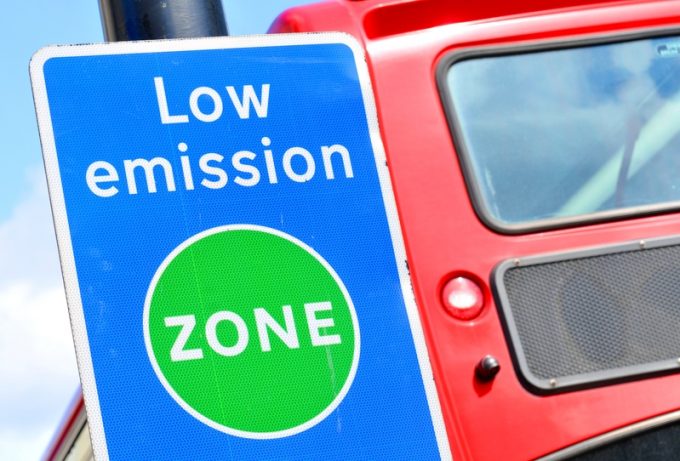NOCC adds third ‘ammonia-ready’ PCTC newbuild orderbook
Norwegian Car Carriers (NOCC) has added a third ‘ammonia-ready’ 7,000ceu LNG-powered ship to its two-vessel, ...
TFII: SOLID AS USUALMAERSK: WEAKENINGF: FALLING OFF A CLIFFAAPL: 'BOTTLENECK IN MAINLAND CHINA'AAPL: CHINA TRENDSDHL: GROWTH CAPEXR: ANOTHER SOLID DELIVERYMFT: HERE COMES THE FALLDSV: LOOK AT SCHENKER PERFORMANCEUPS: A WAVE OF DOWNGRADES DSV: BARGAIN BINKNX: EARNINGS OUTODFL: RISING AND FALLING AND THEN RISING
TFII: SOLID AS USUALMAERSK: WEAKENINGF: FALLING OFF A CLIFFAAPL: 'BOTTLENECK IN MAINLAND CHINA'AAPL: CHINA TRENDSDHL: GROWTH CAPEXR: ANOTHER SOLID DELIVERYMFT: HERE COMES THE FALLDSV: LOOK AT SCHENKER PERFORMANCEUPS: A WAVE OF DOWNGRADES DSV: BARGAIN BINKNX: EARNINGS OUTODFL: RISING AND FALLING AND THEN RISING

London mayor Sadiq Khan has brought forward the introduction of the Ultra-Low Emission Zone by 17 months, pushing the haulage industry into crisis over compliance issues.
Under the new regulations, non-compliant HGVs would be charged £100 a day, vans at a rate of £12.50.
Responding with its usual fiery rhetoric, the Road Haulage Association said it was “outraged” by the news, with chief executive Richard Burnett adding it “flies in the face of common sense”.
The Freight Transport Association agreed that the need to “clean up” London’s air was paramount, but said the move added further uncertainty to an issue that had struggled with clarity.
FTA head of policy for London Natalie Chapman told The Loadstar she fully understood what the mayor was attempting to achieve, but said there were problems with the process.
“The goalposts appear to be constantly moving and the uncertainty over ULEZ has been matched by a distinct lack of clarity on Direct Vision Standard, due to take effect in 2020,” said Ms Chapman.
“Had the mayor’s office made clear what vehicles complied, hauliers would already have begun replacing HGV fleets and London would already be feeling the benefits of cleaner vehicles.”
Mr Burnett said the mayor and Transport for London (TfL) had clearly ignored the RHA’s advice when deciding to bring ULEZ implementation forward from September 2020 to April 2019
“More than half the UK HGV fleet will not be Euro VI when the ULEZ is introduced… this move is little more than a means of quickly bringing in revenue to cover the mayor’s other plans for the city.”
Ms Chapman said the van charge may be workable until operators adopt Euro VI-compliant vehicles, but said the picture for HGVs was far starker.
“HGV operators work to such tight margins that the £100 simply wouldn’t make commercial sense, leaving operators the choice of stumping up for a new vehicle or sub-contracting.
“It simply isn’t fair to put operators in this position, especially as, with the lack of clarity over Direct Vision Standard, new vehicles could become non-compliant less than a year later.”
Mr Burnett said the early adoption would simply send more freight to vans, leading to increased congestion and “undermining the economic wellbeing of the city”.
This, he added, could make air quality even worse.
Alongside the problems for HGV operators, Ms Chapman said early introduction could result in manufacturers being unable to keep up with demand, especially as operators would likely leave it until they had certainty on Direct Vision compliance.
In addition, any sort of second-hand market was “limited at best”, as Euro VI vehicles – those which meet ULEZ standards – have only been operating since last year.
“And this ignores the fact that most HGVs are not ‘off the peg’ and must be built specifically for the individual operator – manufacturers will struggle,” said Ms Chapman.
“Residents in the ULEZ have been given a period of tolerance, and we ask the same for freight operators – especially those that try to meet standards but cannot through no fault of their own.”
Mr Burnett said the trucks being penalised were those responsible for “delivering London’s economy” and filling shelves with food and goods people depend on.
“Many vehicles are already ULEZ and this industry is doing all it can to meet air quality standards, but the acquisition of new vehicles has been planned on the previous mayor’s original dates,” he said.
“Lorries last about 12 years, and to announce adoption 17 months early is not giving operators sufficient time to phase out older vehicles and replace them with Euro VI.
“Hauliers and the people and businesses of London should not be penalised by retrospective regulation that is little more than a tax grab by the mayor.”
Ms Chapman said the mayor and TFL needed to keep in mind progress of ULEZ and Direct Vision and should listen to hauliers and manufacturers if the process was to succeed.
The mayor’s office said in a statement said all revenue raised would be used by TfL to help maintain a “greener transport fleet” and reduce pollution in London.
Comment on this article